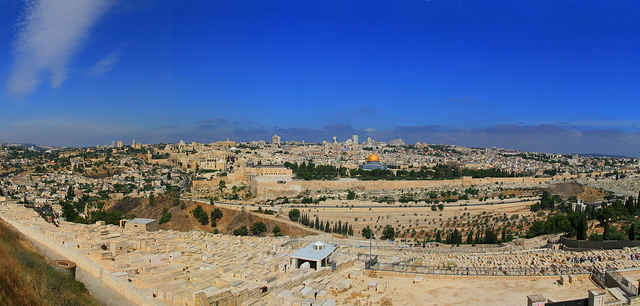Israel and the Six-Day War: a response to David Gardner

David Gardner’s recent Strategist post Israel, the Six-Day War and the end of the two-state solution is what you’d expect from a journalist reporting from Lebanon, a country still officially at war with Israel, and which is so anti-Israel it recently banned the US movie ‘Wonder Woman’ simply because an Israeli actress plays the title role. The reality is different to Gardner’s portrayal.
The Six-Day War was unquestionably a defensive war on Israel’s part, having been preceded by various acts of war from Egypt and its allies, including mobilising forces on Israel’s borders, demanding the withdrawal of UN peace-keepers, and blocking a naval route to Israeli shipping, not to mention blood-curdling predictions of Israel’s imminent demise. Indeed, the West Bank was taken only after Jordan attacked Israel.
Gardner criticises Israel for continuing to hold the West Bank 50 years later, but is this really fair? In the immediate aftermath of its stunning victory, Israel offered to return land captured in exchange for peace. However, that August, the Arab League met, and responded with the ‘three nos’—no negotiation, no recognition, no peace.
In November 1967, UN Security Council Resolution 242 required Israel to withdraw ‘from territories occupied’ in the war in exchange for peace. The resolution specifically didn’t state ‘all the territories’ or even ‘the territories’, because the intention was that final borders be negotiated.
In 1979, in exchange for peace with Egypt, Israel returned the entire Sinai, an area larger than Israel itself. A peace agreement with Jordan followed in 1994.
However, despite numerous attempts, Israel has been unable to conclude a final peace agreement with the Palestinians. The Oslo Accords, reached in 1993, determined that the newly established Palestinian Authority (PA) was to progressively administer more of the West Bank and Gaza, while confidence was built between the sides, and ultimately a Palestinian state would be negotiated.
By 1999, over 95 per cent of Palestinians lived in areas administered by the Palestinian Authority. Then the following year Israeli Prime Minister Ehud Barak, negotiating with Arafat at Camp David, with Bill Clinton mediating, offered a Palestinian state consisting of Gaza, most of the West Bank, land swaps to compensate for areas Israel was to keep, and shared sovereignty in Jerusalem, including the holy places.
Arafat was urged to accept the deal, including by some Arab leaders, but refused point blank. Instead, he launched his terrorist Intifada, which killed over 1,000 Israelis, maimed thousands more, and was only ended by Israeli security measures including the checkpoints and security barrier.
The 2002 Arab peace initiative, endorsed and over-simplified by Gardner, was certainly an improvement on the ‘three nos’, but still had many shortcomings. It demanded a return to the 1967 borders, without the land swaps generally regarded as necessary, it implicitly required the ‘return’ of millions of descendants of Palestinian refugees to Israel, which would end Israel as a Jewish state, and it demanded Israel accept these conditions not as part of negotiations, but as a prelude to them.
It is also untrue to say Israel has refused to ever discuss the proposal. In the years since, various Israeli governments including Netanyahu’s have signalled willingness to negotiate the terms, but have been meet largely with disinterest.
In 2005, after Arafat’s death, Israel under Ariel Sharon tried a different tack, fully withdrawing from Gaza. Instead of a peaceful neighbour, using the infrastructure Israel left behind to prosper, Israel got a Hamas takeover, over ten thousand rockets and mortars, and three wars.
In 2008, Israel’s Prime Minister Ehud Olmert improved on the Camp David proposal, offering land equivalent to the entire West Bank and Gaza, with a land bridge between them, and compensation and limited return for refugees. As PA President Mahmoud Abbas has admitted, he rejected the offer ‘out of hand’.
More recently, he has refused to negotiate in good faith, and then, to talk at all, despite confidence-building steps by the Netanyahu government including freezing settlements and releasing Palestinian terrorists from prison, and an ongoing offer from Netanyahu to negotiate anywhere, anytime, without preconditions.
Instead, the PA incites hatred against Israel through all levels of its society, and encourages terrorism by paying terrorists and their families, to the tune of US$1.1 billion in the last four years alone.
Netanyahu has many times expressed his support for a two-state peace, but he currently has no peace partner. It was in that context that Trump made his comment about a possible one-state solution, meaning that he wasn’t about to try to impose a solution one of the parties, the Palestinians, seemingly has no interest in.
Gardner, and the Palestinians, portray settlements as a major problem, but even Palestinian leaders admit the settlements take up less than two per cent of the West Bank, and most settlers live in areas generally slated for land-swaps. Settlements didn’t prevent the 2000 and 2008 offers.
The real sticking points are that the PA refuses to accept that any agreement means no further claims against Israel, and that it will not be able to flood Israel with a ‘right of return’ for in excess of five million descendants of refugees.
Just as the Six-Day War ultimately led to peace between Israel and Egypt and Jordan, it could ultimately lead to Israeli/Palestinian peace, but that can only happen if the Palestinians have a change of heart and genuinely accept Israel’s right to exist.
